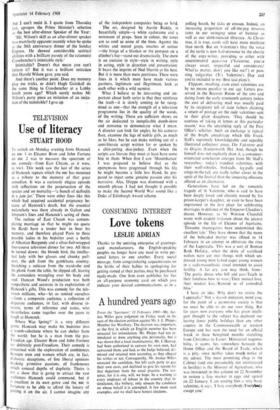Use of literacy
TELEVISION STUART HOOD
To switch on Monday evening from Hancock on BBC 1 to Eleanor Bron and John Fortune on BBC 2. was to measure the spectrum of BBC comedy—from East Cheam, as it were, to Nwl. This week saw the last of the series of Hancock repeats which the BBC has mounted as a tribute to the memory of that great comedian. It was a curiously elegiac episode with reflections on the perpetuation of the species and on mortality—`a bunch of daffodils in a jam jar.' There were other lines like this which had acquired accidental poignancy be- cause of Hancock's death, but the essential melancholy was there already in Galton and Simpson's lines and Hancock's acting of them.
The recluse of East Cheam was contem- plating marriage so that he might (to quote the Bard) have a tender heir to bear his memory, and therefore played Paris to three possible ladies in his bedsitter over a bottle of Albanian Burgundy and a silver-foil-wrapped four-course television dinner for two. All three he turned down: the blonde bird, the intellec- tual lady with her glasses and chunky pull- over, the deb from the gymkhana country. Snatching a suitcase from the wardrobe and the plonk from the table, he slipped off, leaving the contenders wrangling over his body and soul. Duncan Wood's production was both' sympathetic and accurate in its exploitation of Hancock's gifts. This was comedy for the tele- vision millions, who—let us remind ourselves —form a composite audience, a collection of disparate audiences, in fact, with diverse in- terests, terms of reference and tastes, who nevertheless came together over the years to laugh at Hancock.
'Where Was Spring?' is a very different genre. Hancock may make his bedsitter into a womb-substitute where he can shelter from the world; but - he is a man from the pre- Freudian age. Eleanor Bron and John Fortune are definitely post-Freudians. Their comedy is concerned with the exploration of confidences between men and women which are, in fact, elaborate deceptions, of fine liberal opinions masking primitive passions, of franknesses which conceal depths of duplicity. Theirs is not a show that is going to attract the vast audiences Hancock could command, but it is excellent in its own genre and the, BBC is fortunate to be able to afford the luxury of Putting it on the air. I. cannot imagine any
of the independent companies being so bold.
The set, designed by Austin Ruddy, is beautifully simple—a white cyclorama and a minimum of props. Seen in colour, the tones are as cool as some of the lines. Against the whites and muted greys, touches of colour —the fringe of a blanket or the pompon on a climber's hat—stand out dramatically. The show is an exercise in style—style in writing, style in acting, style in direction and presentation. It bears the imprint of Ned Sherrin at his best. But it is more than mere prettiness. There were lines in it which must have made various partners, legitimate and illegitimate, look at each other with a wild surmise.
What I believe to be interesting and im- portant about both series is that they reinforce the truth—it is slowly coming to be recog- nised as one—that the strength of a television programme lies in the quality of the words, of the writing. There are sufficient shows on the air dedicated to inexplicable dumb-show and nonsense to demonstrate what I mean. A director can look for angles, let his cameras flare, examine the legs of nubile girls, as much as he likes, but he can make nothing out of a semi-literate script written for or spoken by a chin-jutting disc-jockey. Even when the scripts are literate they must at least have some bite in them. When first I saw 'Mountbatten' I was prepared to believe that as the eponymous hero progressed through his life. he might become a little less bland, be pre- pared to inject some genuine passion into his narrative. Alas, Dieppe was dismissed with a smooth phrase. I had not thought it possible to make the Second World War sound like a Duke of Edinburgh Award scheme.


































 Previous page
Previous page